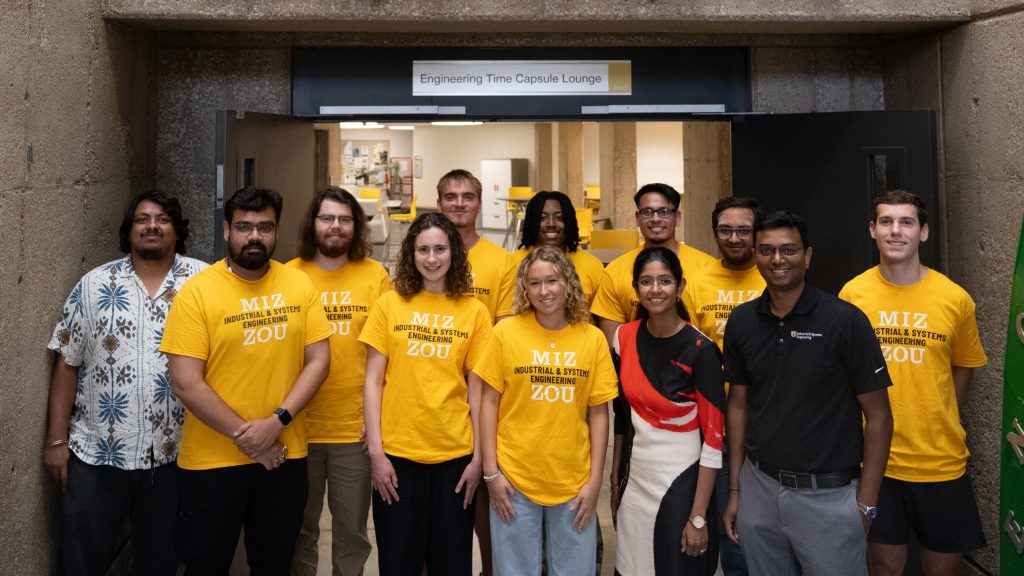September 03, 2025
Undergraduates from across the country spent 10 weeks this summer taking part in the Research Experiences for Undergraduates Site in Research on Prescriptive Analytics for AI-enabled Operations Engineering.

For engineers training for the workforce or academia, engaging with emerging technologies is crucial. At Mizzou Engineering, this hands-on learning approach, known as the Missouri Method, helps prepare them for successful careers.
Undergraduates from across the country spent 10 weeks this summer in Columbia taking part in the Research Experiences for Undergraduates (REU) Site in Research on Prescriptive Analytics for AI-enabled Operations Engineering.
“We explored how AI and prescriptive analytics can solve real-world problems, from optimizing hospital blood supply chains to enhancing cybersecurity for autonomous drones,” said Assistant Professor Suchi Rajendran, who led the REU.
The program gives many students their first opportunity to conduct real research and improve their abilities as scholars and professionals, Rajendran said.
The program led to publications in two top-tier journals; another article is in revisions in another A-level journal. Students in the REU also co-authored three conference presentations, one student group presented at an international conference with a National Science Foundation travel grant.
“Ongoing collaboration among mentors and students beyond the summer has been a valuable outcome,” Rajendran said. “Some REU-developed projects are now integrated into faculty teaching and research pipelines, demonstrating the sustained institutional impact.”
Sparking curiosity, fueling careers
Rajendran’s program has received nearly 600 applications over the past three years, with strong representation from non-PhD-granting institutions. This year, the National Science Foundation-funded program recruited 10 undergraduate scholars from across the nation.
One of them was Natalie Anderson, an industrial engineering major from Purdue University. Anderson used GIS software and Python to optimize truck fleet routing, working with large datasets to develop efficient solutions for disaster debris management.
“I chose this program for Mizzou’s industrial engineering and the REU’s specific area of applied operations as well as Professor Rajendran’s technical focus in emerging transportation and logistics,” she said.
The opportunity to conduct applied research also attracted Texas A&M junior Abhinav Sairam. He employed clustering algorithms, integer programming and heuristic solutions to develop efficient route planning methods for underground freight transportation.
“I joined this REU program to apply my knowledge of algorithms and mathematical modeling to find solutions with real-world applicability,” Sairam said.
Kenzie Markley, a senior data science student from Arizona State University, explored reinforcement learning in her work optimizing last-mile UAV delivery.
“I was interested in the influences of AI on research and wanted to explore that relationship deeper while learning and obtaining research experience for the first time,” she said.
William Echols, a mathematics major from the University of California, Berkeley, also focused on UAVs, exploring cybersecurity vulnerabilities and routing methods under realistic constraints.
“I chose this REU program to gain direct research experience in an applied field in order to expand my applicable technical skills and prepare for graduate school,” he said.
Mizzou industrial engineering senior Caden Davis applied natural language processing techniques to help a behavioral health company analyze customer and employee feedback. He chose the REU to gain experience applying data science to real-world problems
“The focus on health-related analytics and collaboration with faculty aligned well with my academic interests and career goals,” Davis said.
Jackson Miller, a double major in math and physics at Mizzou, gained experience in machine learning, discrete event simulations and vehicle routing problems using GIS software.
“The REU matched with some of my background in math,” he said. “It was a great opportunity to navigate and explore what research would really be like.”
At the end of the program, students presented their research during a poster session, highlighting their technical contributions and reflecting on their growth as scholars.
Participants in REUs like this one deepen their technical expertise and more, Rajendran said.
“They also develop collaboration, communication and problem-solving skills that will serve them well in both industry and academia,” she said. “It’s experiences like this that make Mizzou Engineering a destination for students across the globe.”
Gain a new, transformative perspective on the world. Look into undergraduate research at Mizzou Engineering.